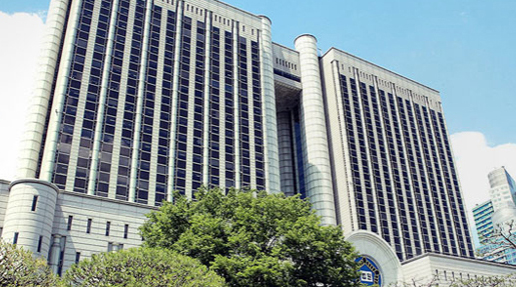A court sentenced a jail term on an Oriental medical practitioner for administering a highly-priced herbal acupuncture injection to a terminally ill cancer patient. The court found him guilty of fraud and breach of the Medical Service Act.
The court said it could not evaluate the safety and efficacy of the pharmacopuncture product and that the Oriental medical doctor’s intravenous injection was beyond his medical license's scope. Pharmacopuncture refers to an intravenous injection of an Oriental medicine ingredient.
The Seoul Central District Court gave 18 months in prison to the Oriental physician, head of an Oriental medical hospital, who was indicted for fraud, violation of the Medical Service Act, and instigation of the medical law violation.

The court also sentenced his colleague doctor to six months in prison with two years of probation.
In 2012, the head of the Oriental medical hospital advertised on the hospital homepage that the wild ginseng pharmacopuncture containing ginsenoside was effective for last-stage cancer patients. He presented exaggerated recovery cases of cancer patients in the ad.
One patient with end-stage liver cancer saw the ad and visited the Oriental medicine hospital in the same year. The hospital head offered the patient a 12-week treatment program and charged 23.76 million won ($21,724).
However, the patient’s symptoms worsened, and CT scan results at another hospital confirmed the deterioration.
However, the Oriental doctor lied to the patient that the tumor size was significantly reduced and that cancer progression was slowing, comparing the first CT scan and those from another hospital. He urged the patient to keep receiving the 12-week treatment, and the patient gave the doctor extra 10.44 million won.
The Oriental medicine physician also said to a second patient that the wild ginseng pharmacopuncture was excellent in fighting cancer cells and that many cancer patients were cured with it. The physician charged 10.69 million won for the injection.
Under the law, anyone who is not a medical practitioner is prohibited from performing a medical practice. Also, a medical practitioner cannot perform medical activities other than licensed ones. However, the Oriental medicine hospital head ordered a nurse to perform the wild ginseng pharmacopuncture on a patient.
The other Oriental medical practitioner conspired with the hospital head to introduce exaggerated recovery cases of end-stage cancer patients and received hefty treatment payments.
The hospital head argued that the pharmacopuncture product contained ginsenoside of wild ginseng and that its anticancer effect was widely recognized. “I did not guarantee the efficacy. I didn’t say that the tumor size was shrinking or the disease progression was stopping, either,” the Oriental medical practitioner said.
He also asserted that the nurse’s intravenous injection was not an unlicensed practice because the nurse performed the procedure under the doctor's supervision.
“Pharmacopuncture is an Oriental medical practice that can be performed by Oriental medical practitioners. Intravenous injections are herbal acupuncture therapies or blood vein pharmaceutical acupunctures that are included in medical practice that Oriental medicine doctors can perform,” he said.
Regarding the false and exaggerated ad, he said he put the ad based on patients’ charts and CT scans and that he neither lied nor exaggerated the data.
However, the court questioned the effect of the wild ginseng pharmacopuncture and determined that the Oriental medical practitioners’ acts violated the related law. Based on this, the court gave them imprisonments but did not arrest them in court immediately after the ruling.
The court said the hospital’s introduction of 28 recovery cases could not be regarded as recovery cases because their photos were irrelevant to any disease progress or those with worsened cases.
“The pharmacopuncture injection contained cheap mountain ginseng, and the ingredient did not include ginsenoside. The effect of intravenous injection of the product in cancer patients has not been proven at all,” the court said.
Using the wild ginseng pharmacopuncture was a chemical modification or refinement of raw materials, the court noted. The Oriental medical hospital administered it to an unspecified person but did so intravenously, which was “not dispensing but manufacturing,” the court said. Also, the hospital head did not have the authority to manufacture it, it added.
The Oriental medicine doctor did not quantify the pharmacopuncture product even though he manufactured it himself. The source of the materials such as wild ginseng was “extremely unclear,” the court went on to say.
The doctor’s phamacopuncture, directly injecting the ingredient intravenously, was in breach of the Medical Service Act, the court noted.
“Injecting a large amount of pharmacopucture solution of about 100cc through an IV is not Oriental medical acupuncture but an attempt to earn the pharmaceutical drug’s effect. So, it is reasonable to say that this practice deviated from the principle of Oriental medicine,” the court said.
According to the court, there was no evidence proving that the pharmacopuncture product received an evaluation from the New Healthcare Technology Assessment Committee or confirmed its safety and efficacy. Thus, the intravenous injection was an unauthorized practice for the Oriental medical practitioner. Regardless of his supervision or guidance, the nurse’s injection was illegal, the court added.
The court said the Oriental medicine doctor and his colleague physician deceived last-stage cancer patients, who are in a desperate situation as if the unverified treatment could treat them and received expensive treatment payments.
As the criminal technique and the damage were grave, the court decided to sentence them to imprisonment, it said.

